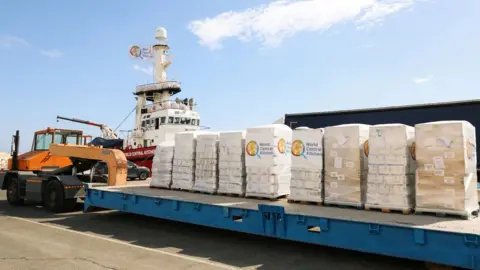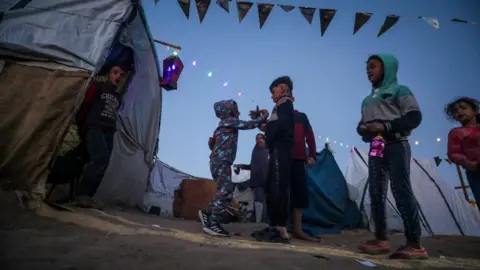Israel-Gaza war: Gaza aid ship yet to leave Cyprus
 World Central Kitchen
World Central KitchenA ship with humanitarian aid for Gaza remains docked in Cyprus, a day after it was due to begin its journey.
A charity leading the mission told the BBC it was "a quickly evolving and fluid situation", but it hoped the ship, Open Arms, would set sail soon.
On Sunday evening, the sighting of the new moon marked the start of the Islamic holy month of Ramadan in Gaza.
A ceasefire remains off the table as indirect negotiations between Israel and Hamas have largely stalled.
The UN has warned that famine in Gaza is "almost inevitable" and children are starving to death.
Aid agencies and Western politicians say the best way to get the amount of aid needed into Gaza is by land.
Last week, UK Foreign Secretary Lord Cameron said the UK, US and EU were continuing to urge Israel "to allow more trucks into Gaza as the fastest way to get aid to those who need it".
He also said Israel should open its container port at Ashdod, north of Gaza, to receive aid shipments from Cyprus until a sea corridor is up and running.
Israel denies impeding the entry of aid or its distribution inside Gaza, and blames UN agencies on the ground for failing to get the aid that is allowed in to the people who need it.
The Open Arms mission is separate to US plans to start building a floating dock off the coast of Gaza to help get aid deliveries in by sea.
A US military ship, the General Frank S Besson, set sail from a base in the state of Virginia on Saturday and is sailing towards the Middle East, carrying equipment to build a temporary pier that could allow large ships carrying aid to be unloaded.
But the Pentagon has said it could take up to 60 days to build the pier with the help of 1,000 troops - none of whom would go ashore.
The Open Arms meanwhile would be the first ship to sail from Cyprus to Gaza under a sea corridor plan announced by the EU, US and UK.
The salvage vessel, still docked in the Cypriot port city of Larnaca, belongs to the Spanish charity of the same name.
The food is being supplied by the World Central Kitchen (WCK), a US charity founded by Spanish celebrity chef José Andrés.
In a video posted from Larnaca's port on Monday morning, Juan Camilo of WCK said "everything is ready" for the ship to set sail.
"From this side we are ready to go and we have our team ready in Gaza to [distribute] this, what we hope is going to be the first of as many as possible trips to Gaza by sea," he said.
The boat will tow a barge loaded with 200 tonnes of food, including rice, flour and cans of meat and fish. The voyage is expected to take about 50 hours.
A spokesperson for WCK told the BBC the charity had started building a jetty on the Gaza coast to get the food to shore.
Some observers have been sceptical about plans to deliver aid by sea. Independent UN human rights expert Michael Fakhri said the US military operation to build a pier would not "prevent starvation and famine by any definition".
 EPA
EPAAs the humanitarian situation has become increasingly dire, several nations have turned to airdrops.
On Friday, there were reports that five people had been killed by a falling aid package north of Gaza City, when its parachute failed to open properly.
Aid trucks have been entering Gaza through the Rafah crossing with Egypt and the Kerem Shalom crossing with Israel, following stringent Israeli security checks on cargo.
But both crossings are in the south of Gaza, and the fighting and breakdown of social order have prevented convoys from reaching northern Gaza, where about 300,000 people are estimated to be living with very little food and water.
Two Israeli-controlled crossing points in northern Gaza have been closed since Hamas gunmen attacked southern Israel on 7 October.
Ramadan brings no respite
In Gaza, Palestinians said they hoped the Islamic holy month of Ramadan could bring an end to war.
"We are now at a war that has eaten the rocks. the trees, the human, everything - there is nothing in Gaza," one man told the BBC's Gaza Lifeline radio service.
A woman displaced from her home meanwhile said her family was making an effort to celebrate.
"We wanted to change for the children and make them happy, so we got lanterns and decorations in the tent. Can you imagine that we are decorating a tent?" she said.
On Sunday, US President Joe Biden said the suffering of Palestinians would be "front of mind" for him and many others as Ramadan came at "a moment of immense pain".
UN Secretary General Antonio Guterres also marked the beginning of the holy month with a video message of "solidarity and support to all those suffering from the horrors in Gaza".
However Israeli Prime Minister Benjamin Netanyahu repeated his intent to send troops into Rafah in southern Gaza, where well over a million people have been displaced after following Israeli instructions to leave other parts of the strip.
"We'll go there. We're not going to leave them. You know, I have a red line. You know what the red line is? That 7 October doesn't happen again," he told Politico.
He said Israel had destroyed three-quarters of Hamas' fighting battalions and the remaining battles would not take more than two months.
Israel's military launched an air and ground campaign in Gaza after Hamas's attacks on Israel on 7 October, in which about 1,200 people were killed and 253 others were taken hostage.
More than 31,100 people have been killed in Gaza since then, the territory's Hamas-run health ministry says.
